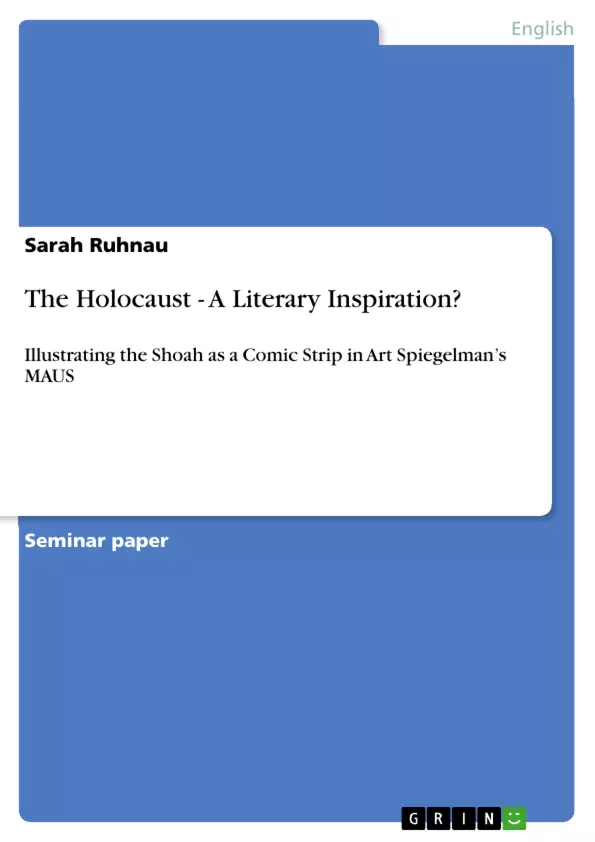In the following paper I would like to examine to what extent the Holocaust is appropriate as a literary inspiration. I will cite Art Spiegelman’s comic strips MAUS I and MAUS II (with focus on the latter) as examples since they are two of the most extraordinary works among Holocaust literature and art.
In general I want to demonstrate that Adorno’s thesis about the impossibility of writing about the Holocaust is not true. By giving the example of Spiegelman’s MAUS it should be made clear that it is even possible to use the Holocaust as some kind of inspiration in a fairly unusual way.
Inhaltsverzeichnis (Table of Contents)
- Introduction
- Holocaust Literature
- Representing the Holocaust
- Fiction or Non-Fiction?
- Adorno and the (Im-)Possibility to write Literature about Auschwitz
- Art Spiegelman's MAUS
- Animal Metaphors
- Guilt, Luck and Survival in Spiegelman's MAUS
- The Second Generation- Second Degree Victims?
- Conclusion
Zielsetzung und Themenschwerpunkte (Objectives and Key Themes)
This paper explores the appropriateness of the Holocaust as a literary inspiration, using Art Spiegelman’s comic strips MAUS I and MAUS II (with focus on the latter) as examples. The paper aims to demonstrate that Adorno’s thesis about the impossibility of writing about the Holocaust is not true, by showcasing how Spiegelman’s work utilizes the Holocaust as a unique and powerful form of inspiration. The key themes covered in this paper include:- The difficulties of classifying Holocaust literature as fiction or non-fiction
- The challenges of representing the Holocaust in an appropriate and aesthetic way while maintaining a correspondence to reality
- The role of guilt, luck, and survival in the experiences of Holocaust survivors and their descendants
- The use of animal metaphors in Spiegelman’s MAUS
- The question of whether the second generation can be considered victims of the Holocaust
Zusammenfassung der Kapitel (Chapter Summaries)
The first chapter introduces the paper's objective to examine the appropriateness of the Holocaust as a literary inspiration using Art Spiegelman's MAUS as an example. Chapter two focuses on the challenges of representing the Holocaust in literature. It explores the debate about the legitimacy of using the Holocaust as a literary inspiration, highlighting the contrasting perspectives of those who believe it is essential to write about the Shoah and those, like Theodor W. Adorno, who argue against it. This section discusses the complexities of classifying Holocaust literature as fiction or non-fiction, and examines the difficulties in achieving a balance between representing the horror of the Holocaust while maintaining respect for the victims. Chapter three delves into Spiegelman's MAUS, examining the use of animal metaphors, the themes of guilt, luck, and survival, and the role of the second generation as potential victims of the Holocaust.Schlüsselwörter (Keywords)
The keywords that represent the main focus of this paper include Holocaust literature, Art Spiegelman, MAUS, fiction vs. non-fiction, representation, animal metaphors, guilt, luck, survival, second generation, Adorno, Auschwitz.Frequently Asked Questions
Can the Holocaust serve as a literary inspiration?
Yes, the paper argues that despite Adorno's famous thesis, works like Art Spiegelman’s MAUS demonstrate that the Holocaust can be addressed through literature and art in a meaningful way.
What is Adorno’s thesis regarding Holocaust literature?
Theodor W. Adorno famously suggested that writing poetry after Auschwitz was "barbaric," implying the impossibility of aestheticizing such horror.
Why does Art Spiegelman use animal metaphors in MAUS?
Spiegelman depicts Jews as mice and Germans as cats to represent the dehumanization and the predator-prey dynamic of the Holocaust in a visually impactful way.
What is the "Second Generation" in Holocaust literature?
It refers to the children of survivors who, while not having experienced the camps themselves, are deeply affected by their parents' trauma and guilt.
How does MAUS address themes of guilt and luck?
The work explores "survivor guilt" and the realization that survival in the camps often depended on mere luck rather than moral superiority or skill.
Is MAUS considered fiction or non-fiction?
The paper discusses the complexities of this classification, as MAUS is a graphic memoir based on oral testimony but uses highly stylized artistic representations.
- Quote paper
- Sarah Ruhnau (Author), 2009, The Holocaust - A Literary Inspiration?, Munich, GRIN Verlag, https://www.grin.com/document/149584



